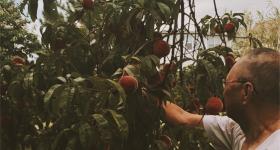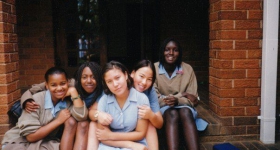Adobo simmers on the stove. The smell engulfs a lonely apartment. A simple dish: soy sauce, vinegar, garlic, bay leaf and whatever cut of chicken is on sale. On a Wednesday evening it is my contribution to a block teeming with the immigrant alchemy. Cookouts and cook-ins, dinner for one or 10. Aromas of the world mingle on a stroll off Vermont Avenue, migrant mecca, immigration-nation. Since I left home, I’ve become a fan of the one-pot dish. With each attempt I work to refine the art, the Sisyphean practice of recreating my mom’s masterpiece knowing full well I’ll never succeed.
I let the adobo simmer. The rice light clicks from green to orange, cook to warm, as the sunlight paints the sky pink to purple. I grab a beer to pass the time, knowing he will be here soon. Somewhere in the stretch of humanity extending from my house to the warehouse where he works, he is clocking out, waiting for a bus, making his way to me.
I sample the stew and turn up the heat. The fragrance of family spurs me back to a full kitchen while I stand alone at the stove. I reconvene a simpler life. A bustling, always hungry family of six: five boys counting dad and one matriarch mother, commander of the kitchen. They fill the empty kitchen, numb the mulling radio. I sit with a collection of memories, a museum of the past that I alone can curate:
A Sunday morning breakfast. Heaps of steaming rice that find their way into every corner of the house. The bright oily red longanisa that will make my brothers and I burp and laugh throughout Mass, eggs and ketchup and bacon and sweet warm squares of bread. Mom is artist in residence, our family her muse, our kitchen her canvas, where she paints a daily masterpiece: feeding a family on a budget. Sunday mornings are a weekly triumph.
I wake up my older brothers, alert them that today we are indeed going to make it to 11 am Mass, mother-willing, dad-abiding, God’s speed. I anticipate the harassment as I peek, open doors to thrown pillows, cursing, and always desperate pleas of, "Ten more minutes!" barking back to me that I report to mom, commander in chief. Any bad news I harbor, slow-moving older brothers or no more hot water or church clothes wrinkled, are a threat to my mom’s sacred goal of not walking in halfway through the homily. We must arrive early to carve out a space fit for a family of six on the hard wooden pews. A weekly act to end the theater of a week, never devoid of drama.
_ _ _
Why do we wonder how the children of immigrants became so creative? My home was a living art installation, pieces of past lands and distant family. Too intimate for LACMA, too soulful for the Louvre, too damn brilliant to be held in any museum or understood by a colonial eye. Mom slipped passed the border without papers, undocumented, unconstrained by nation-state barriers, too free for this land of freedom. The border. How dare an imaginary line on the ground give us so much grief?
Great artists are always misunderstood, and immigrant mothers lead the Renaissance tribe — arriving in new lands, recreating the world in a creative practice that is refined in every step and misstep along the journey. How to take the bus, how to talk to people, how to raise these strange little American-born mixed up babies that through their very birth tear down binary walls. Our parents win no Grammys, hold no degrees in fine art except for the fine art of living in a world they create in hopes of my survival, my success. Mom is no author but she has stories. Because when you leave a country descending into martial law, when you leave two kids behind and end up working at Chick-fil-A in Hawthorne, nobody cares about your bachelor’s degree or your dreams or the stories you tell; they care about their damn waffle fries.
“Why don’t you just go back to wherever you came from?” a coworker bit back at my mom after she told him to help with the coleslaw. Two disappointing tastes in this new country. This land of liberty. If only he knew that Americans came to the Philippines first, an America hell-bent on wanting to “civilize their little brown brothers,” yet in doing so revealed barbarian hearts. If only he knew, but he didn’t.
After the incident with her coworker, my mom told the manager, who fired the man. My mom felt sorry for him; she is a merciful Catholic. She told him to apologize, and he could have his job back. He did, and my mom never heard a peep from him again.
_ _ _
The adobo is boiling now; heated bubbles rush to the surface. I turn the knob to low, watch the raging blue flames shrink into flickers under the heavy pot. I get angry sometimes, when I think too much. Seen too many things I can’t forget, recall too many stories that find themselves flaring up by the slightest wandering thought, triggered by the headlines of the day. I try to wait patiently in company with beer and the radio DJ of the No-Stress-Express, the rush hour playlist meant to calm the tempers of gridlock road rage all over Southern California. Sade soothes me in a story about a smooth operator moving from coast to coast. Under city lights, I reclaim the peace in being home, just one man cooking for another. I bring out the bowls and spoons and set a table for two. I light a candle.
When my man arrives I pull him close. I kiss his neck first, then the high point of a cheekbone and make my way to taste his mouth. My appetite has been building all day. He smiles and so I smile. The little white eye-flame sparks a chemical chain of events in my body and I do not fight to regain composure. I am greedy, wanting to know everything that has happened since we last met, if only so that I can sit, listen and stare at him, the way his eyebrows dance as he tells a story, how his smile slides into the softest part of my heart, reserved for the pleasure of seeing him happy.
I mimic my mom: the rising act, the coming climax of the show. Rice first, adobo next and a saucer of broth to turn every speck of white rice a caramel brown. Two men eating candlelight adobo. This may not be what my mom had ever imagined for me, but I live with the lessons of her fine art: trust your heart, do not mind what others say, survive, create, thrive, defy those that will see you as less than human.
Human. Two lovers, four tangled arms, one twin bed. All the better to hold each other a little closer, listen together as the night blooms. We dream to the rush of the restless freeway river, interrupted by the ambulances headed northbound on Vermont. In the safety of home, any danger can wait for daylight.










Comments